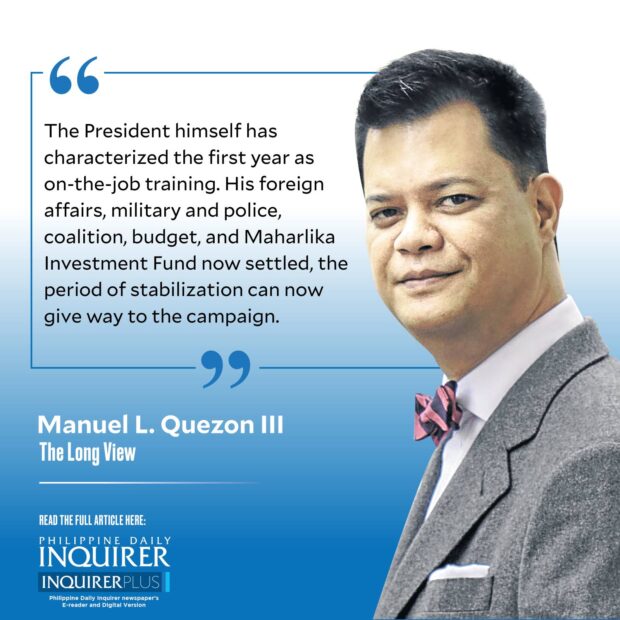Prelude to the mid-term kickoff
Because Ferdinand Marcos Sr. changed the official year in 1978, making it begin in June rather than December, subsequent presidents including Ferdinand Marcos Jr. no longer begin their terms on Rizal Day but rather, on June 30. This means every new president has ended up inheriting a budget from their predecessor, which ties their hands during their first six months in office. The action plan a new president announces during their first State of the Nation Address, in turn, can only kick in when the first full budget enacted under the new president is approved. This foundational budget, in turn, prepares the way for what actually happens starting with the second State of the Nation Address: the mid-term campaign. So when the current, 18th Congress convenes for the second of its three sessions, it will be listening to the President laying out his 2025 mid-term campaign: because it’s the 2024 budget that will matter for those engaged in the mission of ensuring the victory of the administration in the mid-term referendum election.
The prelude to the campaign kickoff is the traditional Cabinet reshuffle after the first year in office. This is when the political tent can further expand with the absorption of candidates who lost in the previous election. For the incumbent President, it’s also the chance to conclude unfinished business as far as the Cabinet is concerned. His handing of the defense and health portfolios to Gilbert Teodoro and Teodoro Herbosa, respectively, leaves the agriculture portfolio as the last major vacancy to be filled. As for reshuffling, observers are waiting to see, for example, whether Jaime Bautista of transportation and communications and Alfredo Pascual of trade and industry, will be retained.
Article continues after this advertisementThe President, true to form, waited until Congress went on recess, to start announcing his new Cabinet appointments. While the one-year, post-election ban on losing candidates expired last May 10, the President didn’t actually announce and swear in individuals covered by that ban until yesterday. There’s a procedural reason for this: Making what’s called ad interim appointments during the congressional recess allows appointees to immediately assume their posts, and hold them until and unless Congress’ Commission on Appointments acts on the appointments by confirming or rejecting them, or the next recess rolls around without action on their appointments, in which case they expire. If the President had made appointments while Congress was in session, the appointments would have expired if the session ended without action on the appointments.
Almost two decades have passed since Teodoro was given the portfolio he now holds again. He has the acquisition of big-ticket items to preside over: the selection of a medium-range fighter; the commissioning of the next generation of capital ships, whether corvettes or destroyers; and the acquisition of light tanks. His commentary in The Diplomat tells us he is fully aligned with the policy of upholding the country’s arbitration victory. He brings a respectable constituency to the administration tent. If we understand the first year of the present dispensation to have been spent gradually asserting control over the armed forces and police, the appointment of a civilian defense chief suggests confidence on the part of the President, and that the military has been sorted out.
The only question that remains is whether the new defense secretary will be counted among the principal advisors and lieutenants of the President.
By all accounts the President’s circle of trust is a highly restricted one: there is, of course, the First Lady; there is Special Assistant to the President Anton Lagdameo Jr.; Interior Secretary Benhur Abalos; head of the Presidential Security Group Gen. Ramon Zagala; and Speaker Martin Romualdez. One thing that sets apart this rebooted administration both from itself, at the start (can you still remember the early names that have been discarded?), and its immediate predecessors, is the lack of organized, identifiable, factions within the Palace. Credit, if that’s the right word, for this state of affairs has been given to the First Lady, of whom the most interesting scuttlebutt at the start of her husband’s term, was that she’d chosen to establish her office in the Presidential Management Staff, a very unconventional, because internal-looking, choice. The President himself has characterized the first year as on-the-job training. His foreign affairs, military and police, coalition, budget, and Maharlika Investment Fund now settled, the period of stabilization can now give way to the campaign.

















